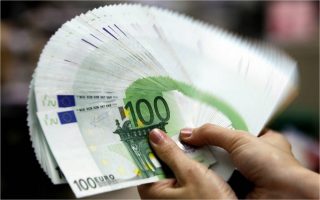Peripheral bond yields inch down as Greece approves third bailout

Low-rated euro zone yields inched down on Friday as Greek lawmakers voted in favour of a new bailout deal shortly before euro zone finance ministers were expected to endorse the accord.
After an all-night parliamentary session, Greek Prime Minister Alexis Tsipras secured enough support for the country's third package of some 85 billion euros ($95 billion). The bloc's ministers still have to approve the deal for aid to be disbursed before Athens must make a 3.2 billion euro debt payment to the European Central Bank on Aug. 20.
The EU Commission has agreed to prepare a further 6.04 billion euros in bridge financing for Greece in case the bailout programme does not allow for near-term payments.
Yields on Italian and Spanish bonds – the biggest markets in the euro zone's southern periphery – shed 1 basis point each, to 1.79 and 1.95 percent respectively, at the end of a tumultuous week driven by Chinese growth concerns neared.
Greek equivalents fell 6 basis points to 10.07 percent . Strategists said the modest moves showed that many in the market had been expecting a deal to be reached swiftly.
The Chinese yuan held steady against the dollar on Friday after suspected intervention by the central bank, soothing fears of further devaluation after the currency dropped some three percent earlier this week.
The currency moves increased concerns about the state of the world's second largest economy and that it might be exporting disinflation to other regions.
In Europe, the ECB's favourite measure of the market's long-term inflation expectations – the five-year, five-year breakeven forward – is wallowing under 1.70 percent, levels not seen since March.
"Inflation expectations are starting to come down again and that should definitely be a factor in where these bond yields are headed," said Ioan Smith, managing director, macro strategy at Knight Capital.
Smith said inflation and growth concerns could pressure the ECB to supercharge its stimulus programme and might complicate plans for the U.S. Federal Reserve to raise interest rates in the coming months.
The prospect of a deal for Greece – which is the culmination of months of fraught negotiations between the leftist government in Athens and international creditors, and which nearly saw the country forced out of the currency bloc – has also cushioned low-rated debt from a broader flight to safety across markets.
European shares, for example, are set for their biggest weekly fall in six weeks.
On Friday, German 10-year yields – Europe's top-rated benchmark – were flat at 0.63 percent, but are set to finish the week around 2 bps lower.
German economic growth accelerated in the second quarter of 2015, data showed on Friday, though by less than expected, with foreign trade acting as a support and domestic investment braking growth, the Federal Statistics Office said on Friday.
[Reuters]





